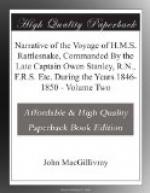Jackey led the way to a creek, and pointed out the place where he had crossed. Jackey said “I threw him down one fellow compass somewhere here.” It was immediately found, it was one of Kater’s prismatic compasses, the name Chislett, London, engraved on the back. Jackey then went to a place where he “plant him sextant,” but the flood had been over the spot and washed it away. When returning I found the trough for an artificial horizon washed upon the banks of the creek, this had been left with the sextant. Jackey crossed the creek, and found a small wooden bottle of quicksilver in the same place where he had left it.
We returned to the scrub where Mr. Kennedy was buried, when we came to it I placed the party (eleven in number) five yards asunder, and traversed it this way in all directions, but without success. I then took Jackey to the plain where the poor gentleman died, and told him to go towards the scrub in the same manner he did when he was carrying the corpse, and not to look back, which he did, telling me the manner in which he carried it, and where he shifted it from one shoulder to the other. In this manner he entered the scrub, and I have no doubt he took us very near the exact place where the body was buried; we sounded the ground all round with our ramrods, but without success. After taking another good look we reluctantly gave up the search, as the night was rapidly approaching, and returned to the boats.
My opinion is, that the remains of the unfortunate gentleman have not been exhumed; if they had, we should have seen some indication of them; the natives would not have taken the trouble to fill the grave, or take away the bones. The soil where he was buried was of a light sandy nature, and the small mound Jackey rose over the grave had been washed down by the heavy rains. The only clue that gave rise to the supposition that the natives had found the body, was the fact that part of Mr. Kennedy’s trousers was found in the canoe taken by the schooner Ariel. Jackey said there were other trousers in the saddlebag, exactly like those he had on at the time of his death. The saddlebags, there is not the slightest doubt, have been found by the natives. Poor Jackey was very quiet, but felt, and felt deeply, during the day. When pointing out the spot where Mr. Kennedy died, I saw tears in his eyes, and no one could be more indefatigable in searching for the remains. His feelings against the natives were bitter, and had any of them made their appearance at the time, I could hardly have prevented him from shooting them.
When we got back to the boats, we immediately proceeded down the creek, being anxious to get clear of the intricate navigation before dark. We succeeded in getting into the open river with difficulty, the numerous snags and branches of trees in the creek, together with the strong current, requiring great precaution to prevent our boats being stove.
A few yards above the place pointed out by Jackey in the morning, where Mr. Kennedy came down to the river for the purpose of crossing, we found the water very shallow, not ankle deep, right across, and had they waited until low-water they might have crossed without difficulty; as we pulled down the river we found numerous shoals, our boat constantly grounding; in fact Escape River is not a river, but an estuary, terminating in swamps.




